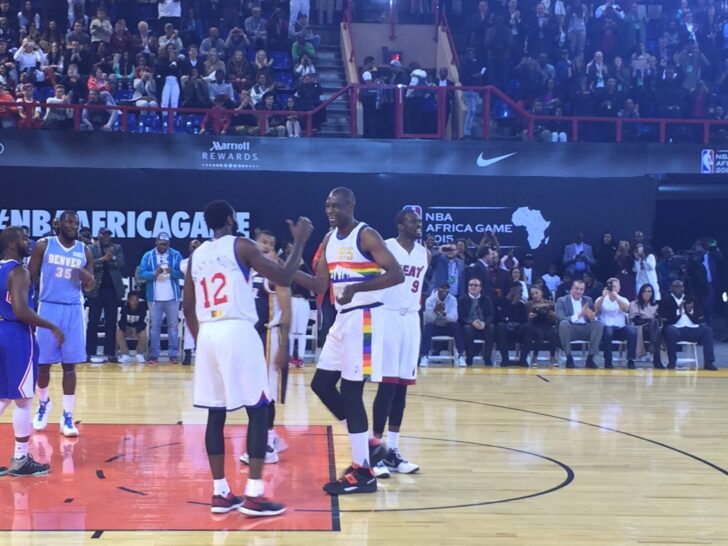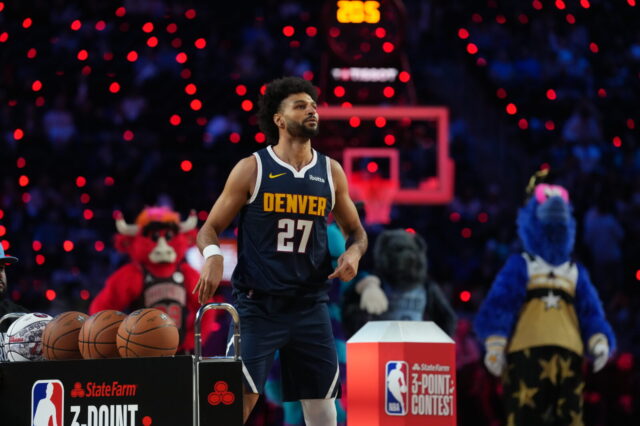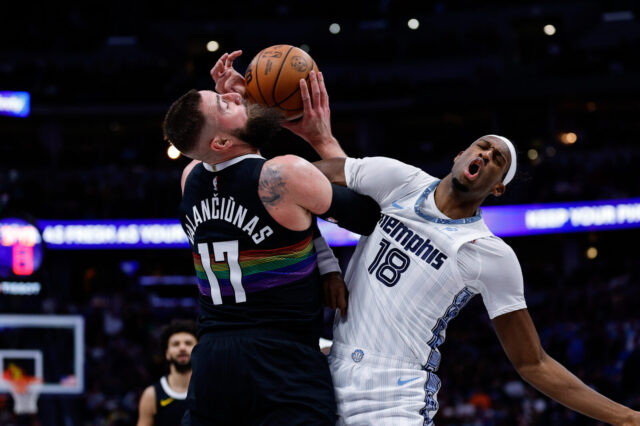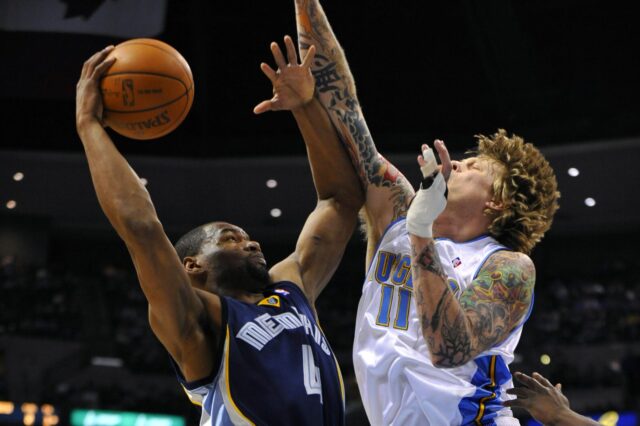During the summer of 1996, I met Dikembe Mutombo for the second time in my life. I was working for Turner Sports in Atlanta during the 1996 Olympics, and one day my boss at the time said to me: “I have good news and bad news for you. The good news is that you’re going to meet Dikembe Mutombo today.” As the biggest Denver Nuggets fan ever to set foot in Atlanta, I was beyond elated. But I had to ask: “So what’s the bad news?” “The bad news,” my boss replied. “Is you’re going to meet Dikembe because he just signed with the Atlanta Hawks.”
My elation quickly turned to devastation.
Just five years prior, in June of 1991, the Nuggets had made Mutombo the fourth overall pick of the NBA Draft (soon thereafter as a 15-year old fan seeking an autograph, I met Mutombo for the first time). Within three years of that draft selection Mutombo had returned the Nuggets to NBA relevancy, culminating with the 8th-seeded, 42-win Nuggets remarkable upset over the 1st-seeded, 63-win Seattle Supersonics in the first round of the 1994 NBA Playoffs (when John Elway gets on the microphone in front of 17,000 rapid fans and yells “Let’s get ready to Mu-tum-bo!!” you know you’ve made it!). Prior to 1994, no eighth seed had ever defeated a one-seed in the playoffs. And the Nuggets did it in dramatic fashion, besting the Sonics in overtime of Game 5 on the floor of Seattle’s Key Arena, with Mutombo blocking eight shots and grabbing 15 rebounds. It was a mountain of a game from a mountain of a player. And the Nuggets almost made history again when after facing a 3-0 deficit to the Utah Jazz in the second round, the Nuggets tied the series at 3-3 and could have been the first team in NBA history overcome a 3-0 deficit and win a playoff series. But it wasn’t meant to be, and the Nuggets fell to the Jazz in Game 7.
But the euphoria of the Nuggets 1994 playoff run soon turned to profound disappointment. During the 1994 off-season, Nuggets star power forward LaPhonso Ellis blew out his knee and the Nuggets just weren’t the same entering the 1994-95 season. The Nuggets head coach at the time, Dan Issel, quit after 34 games, and under the “stewardship” of Nuggets general manager and new head coach Bernie Bickerstaff, the team eked its way to a 41-41 record and a 3-0 first round sweep by the San Antonio Spurs. A series highlighted only by unruly fans at Denver’s McNichols Arena throwing debris onto the court at the officials in the closing Game 3.
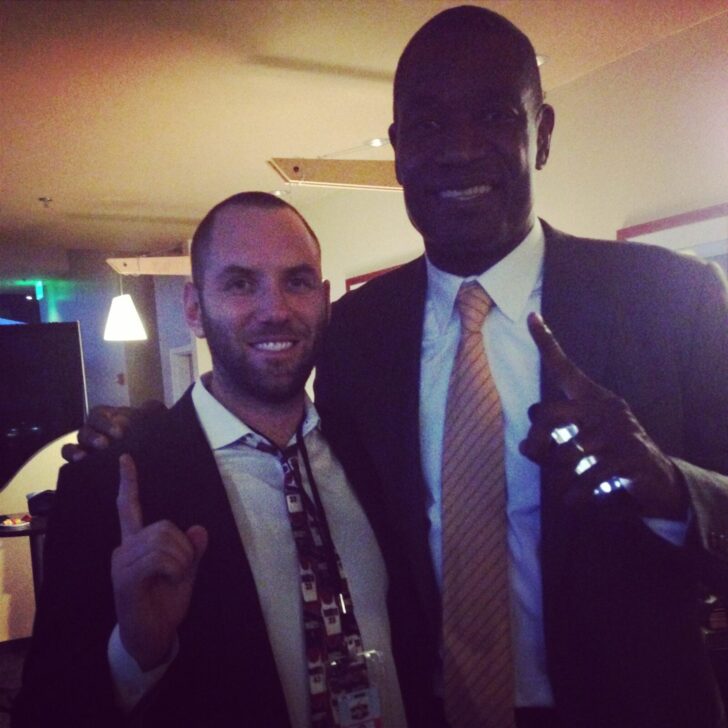
2014 – Denver Stiffs founder Andrew Feinstein and Dikembe Mutombo celebrate the 20th Anniversary of the Nuggets 1994 team that changed NBA history.
The following season – Mutombo’s last in Denver – was even worse. Again playing for Coach Bickerstaff, the Nuggets fell to 35-47 and the season had only two highlights: the Nuggets snapped the 72-win Chicago Bulls 18-game winning streak and Mutombo’s teammate Mahmoud Abdul-Rauf stirred up a good deal of controversy by refusing to stand for the singing of the national anthem. And then Bickerstaff compounded the Nuggets problems by allowing Mutombo to walk – for nothing – when Mutombo signed with the Hawks for five years and $55 million – a bargain even by 1996 standards. Put simply, there was no love lost between Mutombo and the Nuggets after Mutombo’s unnecessary departure, as he had no intention of playing elsewhere (if you need proof, note that Mutombo donned his Nuggets jersey when he briefly came out of retirement to participate in the NBA Africa Game in 2015).
In his five short seasons as a Nugget, Mutombo won a Defensive Player of the Year Award, appeared in three All-Star Games and led the NBA in blocked shots per game for his final three seasons in a Nuggets uniform. Throw in the Nuggets shocking upset over the Sonics in 1994, and Mutombo’s 55 now hangs in the rafters of Ball Arena … a number never to be worn again by any future Nuggets player.
Moving on from Denver, Mutombo would play four-and-a-half seasons for the Hawks (which is why I always thought it was weird that the Hawks retired Mutombo’s 55 before the Nuggets did, but oh well) and make Atlanta his permanent home and final resting place. In addition to the Hawks, Mutombo had stints with the Philadelphia 76ers, New Jersey Nets, New York Knicks and Houston Rocks – playing alongside the likes of Allen Iverson, Jason Kidd, Tracy McGrady and Yao Ming. And in 2015, Mutombo was deservedly inducted into the Basketball Hall of Fame, where he was led to the dais by former NBA Commissioner David Stern and Mutombo’s college coach from Georgetown, the legendary John Thompson.
Mutombo wouldn’t reunite with the Nuggets organization until 2010 when Denver hired Masai Ujiri to take over as general manager, making Ujiri – a close friend and confidant of Mutombo’s – the first-ever African-born person to oversee a western sports franchise. Under Ujiri’s leadership, Mutombo became more present with the Nuggets. In 2011, I had the good fortune to travel with Ujiri and Mutombo to Johannesburg, South Africa to participate in the NBA’s Basketball Without Borders youth camp – a staple of Ujiri and Mutombo’s annual summer schedule. And over subsequent summers thereafter, I spent time with Mutombo at Ujiri’s Giants of Africa basketball camps and court launches, where countless youth have been inspired to “Dream Big” and use basketball as a tool for enrichment and empowerment.
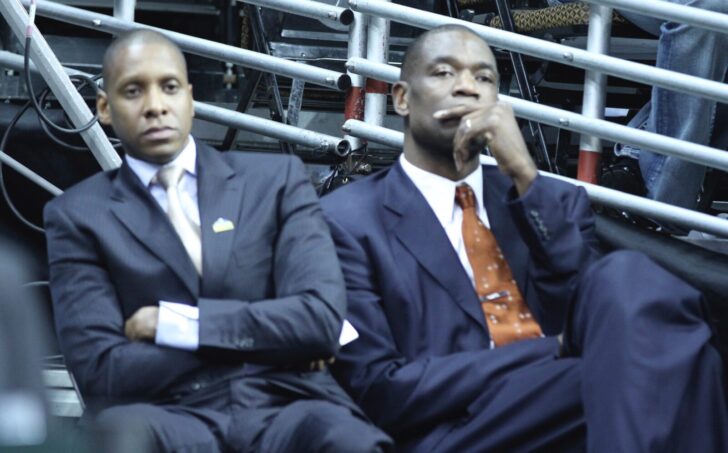
2010 – Dikembe Mutombo (right) reunited with the Nuggets organization after Masai Ujiri (left) took over as the franchise’s general manager. (Photo courtesy of Kevin Preblud)
Using Colorado parlance, Mutombo was a pioneer for Africans playing basketball. Stepping into the giant footsteps left by Nigerian-born Hakeem Olajuwon and Sudan-born Manute Bol, Mutombo further accelerated basketball in Africa and inspired countless youth from the world’s youngest continent to participate in the game. Today, two of the NBA’s last three MVP winners are of African descent and 10% of all NBA players have an African parent … and you can trace that total (which will soon double 20%) back to the impact that Mutombo, Ujiri, Olajuwon and Bol have had on the game.
And even casual sports fans know about the incredible impact Mutombo had on the continent of Africa off the basketball court. He built a hospital in his home country of the Democratic Republic of Congo (DRC), he became the NBA’s first-ever Global Ambassador, he served on the boards of the Special Olympics and UNICEF, and always promoted global health, education and social issues, particularly focusing on improving conditions in the DRC and across Africa.
The news of Mutombo’s passing at the age of 58 has left a void in the basketball world and beyond. As we bid farewell to Dikembe Mutombo, we’re not just saying goodbye to a basketball legend. We’re saying goodbye to a humanitarian, a role model, and a giant in every sense of the word. His finger wag may have become iconic on the court, but it was his heart, his smile, and his unwavering commitment to making the world a better place that will be his true lasting legacy.
Dikembe Mutombo showed us that sports can be a vehicle for change, that athletes can be ambassadors for good, and that one person can indeed make a difference. As we remember him, let’s not just celebrate the shot-blocker or the All-Star or clutching the game ball after closing out the Sonics in 1994. Let’s celebrate the man who used his platform to lift others, who saw beyond borders, and who truly embodied the spirit of global citizenship.
Rest in peace, Dikembe. Your impact will continue to be felt for generations to come. May your memory be a blessing.
